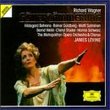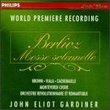| All Artists: Franz [Vienna] Schubert, Franz Liszt, Evgeny Kissin Title: Schubert: Piano Sonata in B-flat; Schubert-Liszt: Four Songs; Liszt: Mephisto Members Wishing: 0 Total Copies: 0 Label: RCA Release Date: 5/4/2004 Genre: Classical Styles: Chamber Music, Forms & Genres, Sonatas, Historical Periods, Classical (c.1770-1830), Romantic (c.1820-1910) Number of Discs: 1 SwapaCD Credits: 1 UPC: 828765842020 |
Search - Franz [Vienna] Schubert, Franz Liszt, Evgeny Kissin :: Schubert: Piano Sonata in B-flat; Schubert-Liszt: Four Songs; Liszt: Mephisto
 | Franz [Vienna] Schubert, Franz Liszt, Evgeny Kissin Schubert: Piano Sonata in B-flat; Schubert-Liszt: Four Songs; Liszt: Mephisto Genre: Classical
It's hard not to be impressed by Kissin's immaculate pianism here, his lovely singing tone captivates while the finger-popping pyrotechnics of the Mephisto Waltz are dazzling. Kissin's interpretation of Schubert's great B-... more » |
Larger Image |
CD DetailsSynopsis
Amazon.com It's hard not to be impressed by Kissin's immaculate pianism here, his lovely singing tone captivates while the finger-popping pyrotechnics of the Mephisto Waltz are dazzling. Kissin's interpretation of Schubert's great B-flat Sonata stresses the lyricism without understating its tragic elements. The opening theme, pocked with little pauses and left-hand ominous rumblings, is wistfully stated, and the clarity of the first climax testifies to Kissin's masterful technique. In some hands the first two movements can sound unvaried but here they're differentiated in tempo and mood. Kissin doesn't flinch from the music's daringly slow tread--the pair take almost 35 minutes, or almost as long as some performances of the entire work, yet Schubert's "heavenly lengths" never outstay their welcome. The song transcriptions are drop-dead gorgeous, not to be missed. But the Sonata is the main show and while Kissin's performance is highly recommendable, don't miss those of Arrau, Rubinstein, or Kempff, among the great older masters who have tackled this work on disc. --Dan Davis END Similarly Requested CDs
|
CD ReviewsAnother "one day" classic from Kissin J. Alfonso | New Haven, CT United States | 07/09/2004 (5 out of 5 stars) "Reviewers of Kissin seem to have lost their collective minds, as sometimes happens when one comes untethered from reality. Oh so many reviewers refuse to reflect, reassess and admit that those they love simply aren't as great as they made them out to be: a crack here, a blemish there, a pervading dullness everywhere. Richter plays the first movement of Schubert's final sonata as if frozen in amber (25 minutes +), yet when he does so, Richter shows philosophical insight. When Kissin plays it, slowly yet spritely in comparison, critics remark his playing is so distended and ponderous that the first two movements have lost their arc. Kissin gives a fresh, innovative reading of a piece and it's denounced as garish. Perrahia gives thoroughly modern, cold, distasteful interpretations of Chopin and everyone hails the ineffable qualities of his recordings. Kissin exercises restraint and reviewers wonder aloud, "Where has the joie de vivre gone in his playing?" Yet when he pushes the envelope, Kissin becomes a portentous potentate with pulverising command but, by implication, not a shred of understanding of what he's playing. Richter unleashes fury when not called for, and his doing so serves to edify and break new musical ground. And so forth. . . I like both Perrahia and Richter (and also Kempff, Gilels, Arrau and company), but I have not fallen to hero worship as many critics have. Whereas critics make an attempt to understand pianists such as Perrahia and Richter on their own terms, no such attempt is made when reviewing Kissin's music - charitability is forgotten, lost, or discarded, and contempt, longing for what never was, and delusion merrily march in its stead. The criticisms of his Schubert playing serve to prove mathematically that Kissin has unfairly become the red-headed step child of critics everywhere. As mentioned earlier, critics have chastised Kissin for his putatively distended, ponderous account of the first movement of the Schubert sonata. But his timing on the first movement is firmly in line with more recent recordings. Pollini, Perrahia, and Lupu play it in 18 to 19 minutes. Uchida and Sokolov top 20 minutes. Another popular criticism is that because he plays the first movement so slowly the sonata architectonically collapses under the oppressive weight of Kissin's artistic vision, since the second movement no longer stands in relief to the overly slow first movement as it should. This "structural" criticism is an interesting one, primarily because of how far off base it is. First, one could criticize all of the other performers listed in this post in the same way: Uchida, Sokolov, Richter, and Perrahia, to name a few, but no one dares mention that other vaunted pianists - whose performances of the piece have been positively reviewed - have played it at a similar tempo. Second, Kissin's playing of the second movement actually differentiates it from the first movement. He plays the second movement more slowly than nearly everyone else does, something he did for the express reason of contrasting the two movements and thus preserving the piece's structure and something the other pianists listed in this paragraph did not do, which - one would think - should have led reviewers everywhere to have apoplectic fits over the way in which these performers had single handedly caused the structure of Schubert's monumental sonata to come crashing down, but they didn't. Instead these nattering naybobs of negativism saved their criticisms for Kissin. But that's enough of defending Kissin: Kissin is more or less someone you love or love to hate; unfortunately for him, the latter is more often true than the former when it comes to his critics. Having had a chance to witness Kissin perform this disc's collection at Carnegie Hall, I can't help but feel lucky. The Waltz is other-worldly. Sharp, beautifully phrased, wonderfully articulated, and skillfully narrated. The telling of the charming of Faust has never been so captivating. After first hearing the third movement of Schubert's final sonata played by Kissin, it was weeks before I stopped replaying it for myself in my mind: glittering, ephemeral playing that speaks of the piece's surprising emotion and sadness - this was Schubert writing at the brink of death; all of this comes through. The first, third and fourth movements are all brilliant and I prefer Kissin's account, not by a long shot, but by a substantial amount, to other excellent recordings by the likes of Perrahia and Uchida. The transcriptions are wonderful and having not heard other recordings I'll refrain from lavishing praise on them, but they really are outstanding. This disc surely will not be recognized as an instant classic, but that doesn't stop me from believing it one day will, when a future generation of critics finally happen upon this disc's singular, definitive recordings of the Mephisto Waltz and Schubert's final sonata." Very mixed bag, but the Liszt is astounding Santa Fe Listener | Santa Fe, NM USA | 09/30/2005 (4 out of 5 stars) "Despite the lengthy and fervent defense in the above review, Kissin's B flat Sonata starts off with a 22 min. first movement that collapses into a formless mess, in no way reflecting Schubert's molto moderato marking and allowing no contrast with the slow movement to follow. After that, however, things improve greatly. The rest of the Schubert sonata is played with lovely lightness and extraordinary phrasing. The Schubert-Liszt song transcriptions are not as free and spontaneous as on some earlier Kissin CDs but are still masterful. And the CD is crowned with a Liszt Mephisto Waltz played with such stunning virtuosity that one doubts if any ohter living pianiist could equal it. Worth the price of the whole CD by itself. Having offered this much praise, I must sitll echo others who have voiced their worry that Kissin has lost some of the artistic subtlety and depth he had ten years ago. We shall just have to wait and see what the future brings to this great pianist." Portentous Schubert and Stunning Liszt Hank Drake | Cleveland, OH United States | 10/02/2009 (3 out of 5 stars) "Evgeny Kissin's recording of Schubert's B-flat sonata begins at a crawling tempo that sounds like an attempt to imitate Sviatoslav Richter. One wonders if Kissin actually feels the music should go this way, or is dragging the tempo in order to seem "profound". (He includes the exposition repeat, which adds another five minutes to the proceedings.) In the development, Kissin briefly kicks up the tempo a bit. While this should seem to enliven the movement, his acceleration (which reverts back after the development), merely throws it off kilter. It's a mite schizoid.
The second movement fares even worse. Labeled an "andante sostenuto", it's played at a tempo that could be called an "adagio quasi largo." The problem with this tempo is not merely that it makes the music crawl, but it would have been unworkable on the pianos of Schubert's time: the music would have sounded dissociated due to the short sustaining power of the instrument. There's even a technical bauble at 6:26, surprising given how tightly edited Kissin's recordings are usually. Kissin rips through the outer sections of the Scherzo, turning them into a Presto. He slows down for the Trio - - about the most normal playing to be found in this piece. The concluding movement zips along without incident, although there are some annoying cutesy-poo effects like playing legato chords as staccato. After the dragging of the first two movements, and the rushing of the third, it comes as an anticlimax. If the former wunderkind Kissin wanted to prove he was mature by playing Schubert this way, he overshot the mark. Schubert is not merely a "winter wandered shadowed by death", there is joy and charm to be heard in his music as well - - even the late pieces. Kissin's Schubert is portentous and pretentious. The song transcriptions fare a bit better. One secret to playing these pieces is to remember that they are not Schubert, but rather Schubert-Liszt. Both factors need to be respected. In Ständchen, Kissin holds his own against mighty rivals Rachmaninoff and Horowitz, but he is considerably less imaginative than either. He let's some color unfold in Wohin and Aufenthalt and the effect is like a flower blooming. The high point of this disc is Liszt's Mephisto Waltz. This performance is an excellent example of how to build toward a climax: Kissin starts the piece rather coolly, with lighter than usual articulation and spare use of the sustaining pedal; about three minutes in, he slows down for the hypnotic, ruminative part - he's hold back, milking the music; about eight minutes in, Kissin goes into overdrive lets loose a fury of demonic passagework, bringing the piece to a resounding finish. This is one of the best Mephisto Waltzes I've ever heard - and I've heard many. I can only respond to such playing with a stunned "Wow." Given how Sony/BMG is constantly repackaging recordings, this Mephisto is a candidate for a "Best of Kissin" disc. The unfortunate performance of the Schubert can be left behind. The sound is fine. " |

 Track Listings (9) - Disc #1
Track Listings (9) - Disc #1








